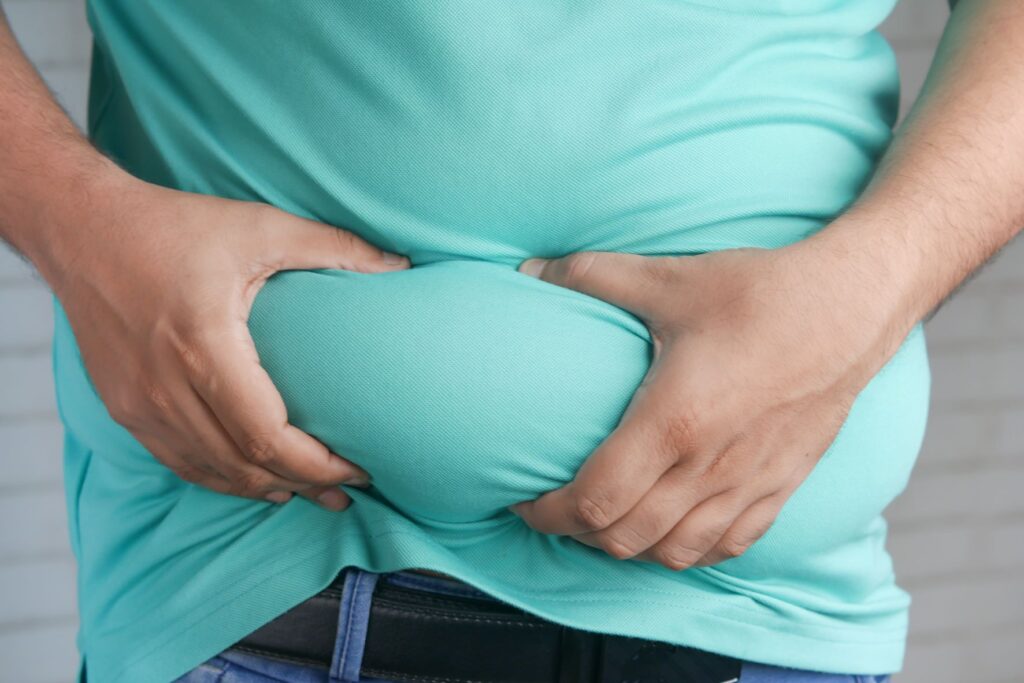We all know how important sleep is in our lives. It is an essential function that allows our bodies and mind to recharge and recover. Continuous lack of sleep can disrupt the proper functioning of our natural life processes, which may lead to various health conditions and illnesses.
Almost 70 million Americans suffer from chronic sleep deprivation. What’s more, 22 million of those are diagnosed with sleep apnea. The direct cause of sleep apnea is a narrowed airway, which is mainly detected in people with obesity, but there are cases where sleep apnea is diagnosed in skinnier patients due to abnormal anatomy. Those with uncontrolled sleep apnea tend to gain weight over time due to the lack of deep sleep and high cortisol level. It is a vicious cycle that needs to be corrected before it’s more severe. Understanding the link between sleep apnea and obesity is often crucial for determining appropriate treatment. Read our guide and learn about sleep apnea’s key features and aspects and how it correlates with obesity.
Check our Weight Management services
What Is Sleep Apnea?
Sleep apnea is a sleeping disorder that causes breathing to start and stop repeatedly and unusually. The interrupted sleep prevents your body from going into REM or deep sleep (restorative sleep). Your body wakes up hundreds of times a night without you even knowing. If left untreated, it can be a serious condition that may lead to significant health problems, such as high blood pressure, pulmonary hypertension, coronary artery disease, or diabetes.
People who suffer from sleep apnea may experience one of the three main types of the disorder:
- Obstructive sleep apnea – it’s considered the most common type of sleep apnea and occurs when the throat muscles relax. It causes irregular breathing and loss of breath due to narrowing or closing the airway while breathing. This is caused by the anatomical changes with obesity.
- Central sleep apnea – occurs when there is an issue with the signals sent by the brain to the muscles that control breathing.
- Complex sleep apnea syndrome – detected when a patient is diagnosed with both obstructive and central sleep apnea.
What Are the Symptoms of Sleep Apnea?
As the symptoms of obstructive and central sleep apnea are almost the same, it is often difficult to distinguish which type of sleep disorder you are experiencing. A sleep study and discussion with a specialist will help you differentiate between the two.
In general, you might have sleep apnea if you snore loudly and wake up feeling fatigued even after having slept the required hours.
Other most common signs and symptoms of sleep apnea include:
- Episodes when you stop breathing during sleep – often detected by another person
- Having trouble breathing and gasping for air during sleep
- Loud snoring
- Often feel tired, fatigued, or sleepy during the daytime.
- High blood pressure
- High BMI
- Waking up having a dry mouth
- Waking up with a headache
- Having trouble falling or staying asleep (insomnia)
- Having difficulty with concentration and focus
- Irritability
It may sometimes be difficult to tell if the symptoms you’re experiencing indicate sleep apnea. If you think you may have a sleep condition, the best option is to get in touch with your primary care provider, who will decide on further action.
What Factors Cause Sleep Apnea?
Regardless of the age, sleep apnea can affect anyone. Still, certain risk factors increase the chances of developing the condition.
Some of the most common risk factors include:
- Age – older people are more likely to experience sleep apnea
- Gender – males are two to three times more likely to develop the condition than females
- Excess weight and obesity
- Thicker neck circumference
- A narrow throat or airway
- Nasal congestion or nasal polyps
- Family history of sleep apnea
- Frequent use of alcohol, sedatives, or tobacco
- Medical conditions, such as type 2 diabetes, Parkinson’s disease, congestive heart failure, high blood pressure, hormonal disorders, chronic lung diseases (asthma)
- History of stroke
Does Sleep Apnea Cause Weight Gain?

In some cases, sleep apnea may cause weight gain, and there are various reasons behind it.
One of the most significant factors that may lead you to put on weight after being diagnosed with sleep apnea is your decreased energy levels. As perpetual sleep deprivation leads to repeated fatigue, it then results in low activity during the day, which can favor weight gain.
Moreover, people suffering from sleep apnea often experience hormonal imbalances that can disturb the body’s natural reactions. A higher level of cortisol causes weight gain by increasing hunger hormones and telling your body to retain fat.
How to Treat Sleep Apnea?
Many people who are diagnosed with sleep apnea and are experiencing severe signs of it need to use a device called a CPAP machine. It gently pumps air into a mask you wear over your mouth and nose during sleep. The machine improves your breathing and quality of sleep while reducing the risk of problems related to sleep apnea.
However, if you have been diagnosed with sleep apnea and are noticing weight gain, or you’re living with obesity that is the cause of your sleep condition, the best treatment option for you may be weight loss surgery.
Decreasing your body weight can effectively alleviate sleep apnea symptoms and lower the risk of developing a lifelong sleep condition. It has been reported that losing only 10% of your body weight decreases the risk of having sleep apnea by 25%.
If you are considering losing weight to ease your sleep apnea signs, the best idea is to consult a weight loss doctor or obesity doctor who will work out the best solution for your needs.
Final Thoughts
Sleep apnea is a serious medical condition related to sleep deprivation. It is caused by narrowed airway, which impedes effortless breathing resulting in snoring, choking, and gasping for air during sleep.
Various aspects cause sleep apnea, and obesity is one of the most significant factors. Not only overweight people are more prone to experiencing sleep apnea, but also patients diagnosed with the condition often notice weight gain.
As sleep apnea and obesity are closely linked, losing weight may be the best option to alleviate the symptoms of the sleep condition and prevent it from developing long-term.
